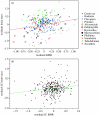Metabolic costs of brain size evolution
- PMID: 17148287
- PMCID: PMC1834002
- DOI: 10.1098/rsbl.2006.0538
Metabolic costs of brain size evolution
Abstract
In the ongoing discussion about brain evolution in vertebrates, the main interest has shifted from theories focusing on energy balance to theories proposing social or ecological benefits of enhanced intellect. With the availability of a wealth of new data on basal metabolic rate (BMR) and brain size and with the aid of reliable techniques of comparative analysis, we are able to show that in fact energetics is an issue in the maintenance of a relatively large brain, and that brain size is positively correlated with the BMR in mammals, controlling for body size effects. We conclude that attempts to explain brain size variation in different taxa must consider the ability to sustain the energy costs alongside cognitive benefits.
Figures
References
-
- Aiello L.C, Wheeler P. The expensive-tissue hypothesis—the brain and the digestive-system in human and primate evolution. Curr. Anthropol. 1995;36:199–221. doi:10.1086/204350 - DOI
-
- Barrett L, Henzi P. The social nature of primate cognition. Proc. R. Soc. B. 2005;272:1865–1875. doi:10.1098/rspb.2005.3200 - DOI - PMC - PubMed
-
- Brody S. Reinhold; New York, NY: 1945. Bioenegetics and growth.
-
- Byrne R.W. The technical intelligence hypothesis: an additional evolutionary stimulus to intelligence? In: Whiten A, Byrne R.W, editors. Machiavellian intelligence II: extension and evaluations. Cambridge University Press; Cambridge, UK: 1997. pp. 289–311.
-
- Byrne R.W, Whiten A. Clarendon Press; Oxford, UK: 1988. Machiavellian intelligence: social expertise and the evolution of intellect in monkeys, apes, and humans.
Publication types
MeSH terms
LinkOut - more resources
Full Text Sources

